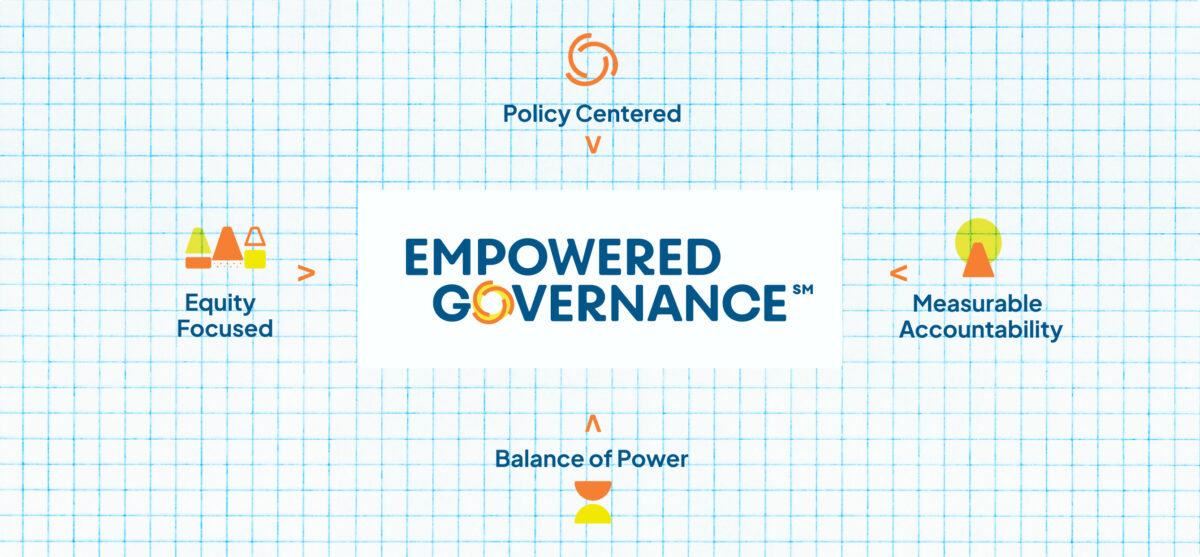Empowered Governance Toolkit
Our policy-centered governance model offers a more accountable, power-balanced, and equity-focused approach to the work of school boards. Take a few minutes right now to create an account for free access to four model policies below.


The Empowered Governance Framework and Policy Toolkit was built by current school board members with extensive experience supporting and training other board members across the country. It provides a guiding framework, 35+ model policies, case studies, research, and practices that board members and superintendents can start using today to implement positive change for students.
What is a school board governance model? A governance model defines the principles by which a Board operates - including structures, roles and responsibilities, and accountability.
Empowered Governance Has Four Core Principles:

Model Policies
Engagement
Community Engagement
Student Board Member
Board Transparency
Teachers Union Contract Exemplar
Governance Structures
Board Governance
Standing Committees
Board Professional Development
School Board Legal Counsel
Policy Review Protocols
The 5 Roles of a School Board
Board Protocols and Decorum
Board Self-Evaluation
Free Policies
Superintendent Evaluation
The Superintendent Evaluation policy ensures a rigorous process for assessing the Superintendent's effectiveness in leading the district toward accomplishing its mission, vision, goals, and objectives. The annual evaluation is based primarily on measurable student outcomes and includes a qualitative 360 assessment of leadership competencies and a 360 community survey to solicit broad input from school system constituents. The annual evaluation should be the primary basis for employment contract renewal / termination.
FREE POLICY
Policy Toolkit for Superintendent EvaluationClimate Action
Resources that support school board members to lead on climate mitigation, adaptation, education, and equity within their districts. (Developed in partnership with UndauntedK12 and This is Planet Ed)
FREE POLICY
Policy Toolkit for Climate ActionStudent Voice on Boards
The Student Representation and Student Member policies outline the primary methods and structures for the Board to engage with students and receive student input to inform decision-making. One policy establishes a “student advisory council” to engage student representatives from all high schools in the district, while the second policy includes voting student members of the board. (Developed in partnership with Our Turn)
FREE POLICY
Policy Toolkit for Student Voice on BoardsEquitable Budgeting
The Budget and Finance policies establish foundational procedures for a robust and transparent budget approval process. The policies also ensures the annual budget intentionally allocates resources to align with the strategic plan and the improvement of student outcomes. (Developed with input from Edunomics Lab at Georgetown University)
FREE POLICY
Policy Toolkit for Equitable BudgetingMembers Have Full Access
Become a member. Maximize your impact. Upon signup, you’ll receive access to resources like our Empowered Governance Toolkit, and get connected with a national community of school board members. Plus so much more!
Join the WaitlistEngagement
Community Engagement
The Community Engagement policy sets minimum expectations for community engagement activities of all Board members. The policy provides for non-English language translation services for all Board meetings and materials. Board members are also required to convene town hall meetings in their districts and visit schools on a regular basis.
MEMBERSHIP ONLY
COMING SOON
Student Board Member
The Student Board Member policy that provides for similar structures as the Student Representation policy, except that the student board member does have voting power on the School Board. (Developed in partnership with Our Turn)
MEMBERSHIP ONLY
COMING SOON
Board Transparency
Policy ensuring board practices and decision-making processes are visible and transparent to the public as much as possible.
MEMBERSHIP ONLY
COMING SOON
Teachers Union Contract Exemplar
We believe it is possible to create a contract that is good for students and good for teachers. Our model teacher contract gives school board members an alternate set of ideas to bring to the negotiating table. (In development)
MEMBERSHIP ONLY
COMING SOON
Equity
Equity
The Equity policy outlines parameters for implementation of and accountability for practices promoting equity for staff and students. The policy establishes guardrails for equitable practices in policy making, student access to schools, student discipline, school policing, constituent engagement, workforce and workplace, and procurement. Most importantly, the policy provides for rigorous performance metrics and reporting routines to ensure transparent accountability for equity throughout the district.
MEMBERSHIP ONLY
COMING SOON
Student Discipline
The Student Discipline policy outlines expectations for district implementation of student discipline practices. The policy promotes positive and restorative discipline practices, protects the rights of students and parents through a fair and transparent grievance process, and ensures rigorous data metrics and reporting routines to ensure accountability with the policy.
MEMBERSHIP ONLY
COMING SOON
Teacher Diversity
The Teacher Diversity policy promotes the hiring, development, and retention of a diverse teacher workforce. Research has demonstrated a strong correlation between teachers of color and positive academic, behavioral, and socioemotional outcomes for students. This policy encourages the district to intentionally recruit, support and retain teachers of color, while also holding the district accountable to measurable progress towards a workforce that is fully reflective of the student population.
MEMBERSHIP ONLY
COMING SOON
Open Enrollment
This policy requires the district to make all schools accessible to all students regardless of where in the district a student may live. This is accomplished by providing for an equitable process for how students may bypass their neighborhood school assignment and gain access to other schools in the district – especially when those schools may be higher performing. The policy also requires the district to provide free transportation to any student attending a school within the district that is not their neighborhood school, ensuring economic means are not a barrier to equitable school access.
MEMBERSHIP ONLY
COMING SOON
Governance Structures
Board Governance
The Board Governance policy defines the overarching governance principles and primary roles and responsibilities of the Board. This policy helps ensure the Board “stays in its lane” of holding the district accountable and creating policies that enhance conditions for equitable student outcomes. These principles are foundational for ensuring the Board stays focused and effective while establishing a healthy relationship with the Superintendent.
MEMBERSHIP ONLY
COMING SOON
Standing Committees
The Standing Committee Policy establishes the charters for standing committees, their membership, and their primary roles and responsibilities. The four primary committees are Accountability, Policy, Property and Finance. In addition, the policy allows for the establishment of ad hoc special committees to make recommendations that address specific issues / concerns of the Board.
MEMBERSHIP ONLY
COMING SOON
Board Professional Development
The Board Professional Development policy provides for members of the Board to participate in on-going professional development activities. Professional development for Board members should increase the Board’s capacity in policy making, fiscal oversight, and effective representation of diverse communities in pursuit of improved student outcomes. The policy also ensures quality control, requiring evaluation of all trainings and preventing unsatisfactory training providers from being engaged again for at least two years.
MEMBERSHIP ONLY
COMING SOON
School Board Legal Counsel
The School Board Legal Counsel policy provides for three different roles for legal counsel: the district general counsel on staff, independent Board counsel via a third-party firm, and special counsel via a third-party firm with specialized expertise to represent the Board in court matters. This differentiation of roles for attorneys helps mitigate potential conflicts of interest among attorneys providing the administration or the Board with legal counsel.
MEMBERSHIP ONLY
COMING SOON
Policy Review Protocols
This resource outlines suggested procedures and protocols for conducting a comprehensive review of all Board policies. It is important for the Board to define clear roles and responsibilities during the policy review process, ensure a manageable number of policies are handled at any given time, prioritize policies that have the most influence on student outcomes, and provide transparency to the public regarding the policy changes that are being proposed / acted upon.
MEMBERSHIP ONLY
COMING SOON
The 5 Roles of a School Board
This document outlines the essential roles of a school board within the Empowered Governance framework. The Board should generally NOT be engaged in activities outside of these five key roles unless required by law. Empowered Governance consulting services are designed to support Boards with deliverables that fall within these domains.
MEMBERSHIP ONLY
COMING SOON
Board Protocols and Decorum
This policy defines essential operating procedures of the Board, such as agenda preparation, parliamentary procedures, meeting conduct, Board President roles, etc. This policy seeks to ensure that the Board operates respectfully and effectively while also acknowledging that disagreement and healthy conflict is vital for our democracy, especially as boards become more representative of the families they serve.
MEMBERSHIP ONLY
COMING SOON
Board Self-Evaluation
This policy outlines the primary expectations for content and frequency of board self-evaluation. Individual board members can currently self-assess using our Effectiveness Rubric at https://schoolboardpartners.org/self-assessment
MEMBERSHIP ONLY
COMING SOON
Measurable Accountability
District Data Monitoring
The District Data Monitoring policy ensures that the Board monitors comprehensive, measurable data across all major areas of district performance on a regular and routine basis. The Board will also leverage this routine data monitoring activity to inform and develop 3-5 annual goals that identify the Board’s highest priorities for district accountability and serve as the basis for superintendent evaluation. This policy ensures the Board is monitoring a rigorous and comprehensive set of metrics as the primary basis of its board meetings, rather than defer to the administration to determine what data is presented to the Board.
MEMBERSHIP ONLY
COMING SOON
High Quality Instructional Materials
This Board policy sets the guardrails for how high quality instructional materials should be selected by District staff and approved by the Board.
MEMBERSHIP ONLY
COMING SOON
Sample Board/District Annual Goals
These sample metrics represent a rigorous approach to summative annual district goals for academic and non-academic outcomes, as well as a solid foundation for any superintendent evaluation. A district may choose to adopt all or some of these metrics, perform a data analysis to determine baselines, and establish numerical annual targets for each metric. Empowered Governance offers facilitation services to assist Boards with developing and approving their annual goals.
MEMBERSHIP ONLY
COMING SOON
School Performance Framework
This policy requires the District to annually monitor the academic and non-academic performance of schools within the District, provide public transparency of the performance of each school, and take action to ensure that the District's portfolio of schools is consistently improving so that every student has access to a high quality school of their choosing. (In development)
MEMBERSHIP ONLY
COMING SOON
School Closure Policy
This policy outlines permissible situations where the district may consider school closure, best practices for ensuring closures result in improved outcomes for the affected students, and community engagement activities required by the Board to ensure the effective management of any future school closures in the district.
MEMBERSHIP ONLY
COMING SOON
Charter Accountability Policy
When school boards are charter school authorizers, they have three principals to uphold: maintain high standards for schools, uphold school autonomy, and protect student and public interests. (In development in partnership with NACSA)
MEMBERSHIP ONLY
COMING SOON
Financial Stewardship
Financial Reporting
The Financial Reporting policy defines minimum requirements for routine financial reporting to the Board. The policy also ensures the budget and budget variance reports are reported at both the school and district level with proper engagement from school leaders. Management reports are also required to demonstrate per pupil expenditures in relation to student outcomes, and how expenditures are aligned with strategic priorities.
MEMBERSHIP ONLY
COMING SOON
Fund Balance
The Fund Balance policy to establish guardrails and ground rules for potential usage of cash reserves. The policy defines specific limited situations where the general fund balance can be appropriated to annual expenditures. A review and approval process for the Board is also outlined to ensure full transparency and public accountability.
MEMBERSHIP ONLY
COMING SOON
Procurement
Policy to establish minimum expectations for procurement practices that ensure financially prudent practices in addition to promoting access to contract opportunities for disadvantaged business enterprises.
MEMBERSHIP ONLY
COMING SOON
Other Tools
Strategic Planning Process
This model strategic planning process outlines the roles and responsibilities between the Board and administration for the development of a strategic plan, as well as a robust process for ensuring the strategic plan is data-driven and well-informed by the community.
MEMBERSHIP ONLY
COMING SOON
Robert's Rules Cheat Sheet
This 1-pager contains the most essential Robert's Rules of Order for school board members. This resource may be utilized by Board members on the spot while in a board meeting to ensure effective management of motions and other meeting procedures.
MEMBERSHIP ONLY
COMING SOON
Racial Disproportionality Metrics
This cheat sheet explains the calculation methodology for how to quantify racial disproportionalities in school discipline, special education, or other student outcomes or experiences.
MEMBERSHIP ONLY
COMING SOON
Curriculum Approval
This policy outlines the Board's critical role in approving curriculum and instructional materials that are research-based, culturally relevant, accessible and high quality.
MEMBERSHIP ONLY
COMING SOON
Superintendent Hiring
Policy outlining minimum expectations for the district’s conduct of a superintendent search and hiring process. (In development)
MEMBERSHIP ONLY
COMING SOON
OnBoarding
This procedural document provides suggestions for how to onboard a new Superintendent, or for a Superintendent to onboard new School Board Members. Thoughtful and effective onboarding can be the key to starting off these critical relationships on the right foot. (In development)
MEMBERSHIP ONLY
COMING SOON
Board - Superintendent Communication
This procedural document provides a framework for how to discuss and document expectations about how individual school board members should communicate with the Superintendent, with each other, and with other district staff. Being explicit about how effective communication should look can make a huge difference in the functioning of the Board and Superintendent. (In development)
MEMBERSHIP ONLY
COMING SOON
School Board Partners Fellows have already passed many of these policies with our support! See exemplar policies passed in school districts across the country.
Exemplar Policies Passed